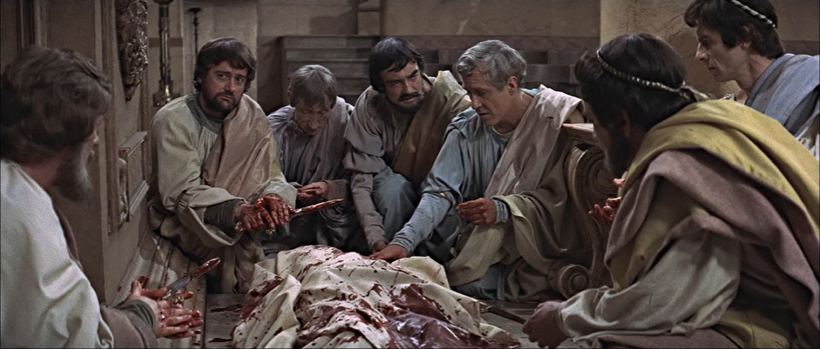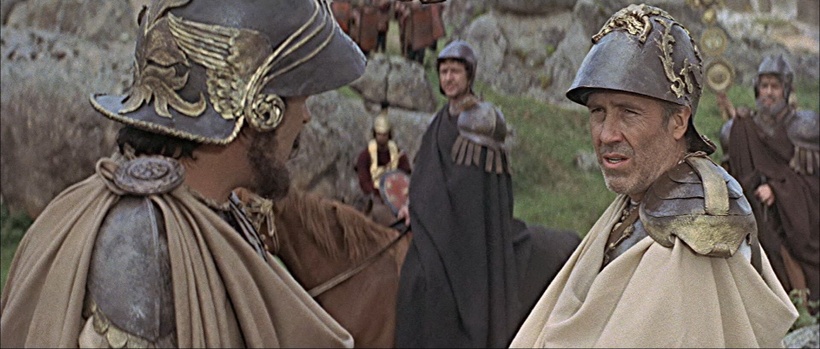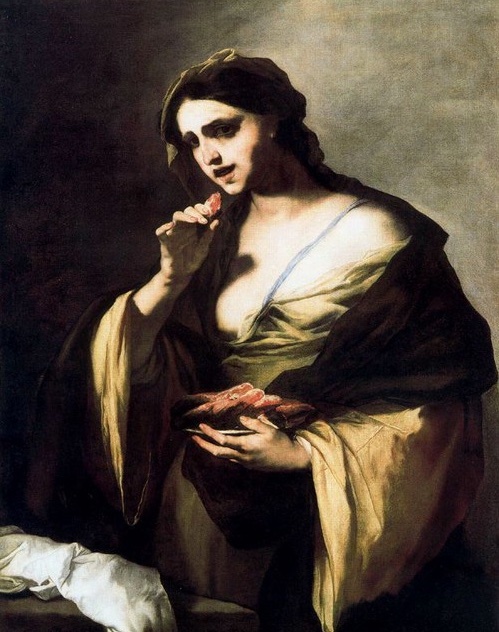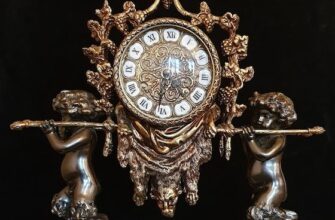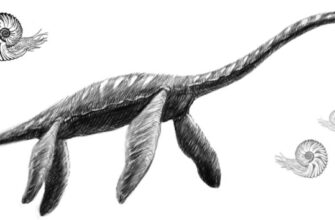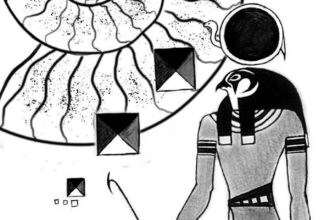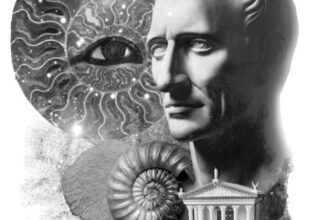Disclaimer: this chapter is translated by DeepL. The text will be updated after the translation has been corrected by a professional editor.
In encyclopedias, the generally accepted conception of Shakespeare’s Julius Caesar and the historical account of Brutus’ conspiracy is based on Plutarch’s biased description of the events. Plutarch is a priest/public official at the temple of the patron god of all homosexuals. The gays probably wouldn’t hire indiscriminantly just anyone who wanted to become an official at their temple. They would choose only someone with a similar way of thinking.
Then, for millennia, everyone, including historians, only reiterates Plutarch’s version of the events, which is inconsistent but pleasing to certain groups of people. And his version is as follows. Brutus and the conspirators who voluntarily supported him were supposedly the best people of Rome. The proof of this is allegedly that they used to praise and glorify themselves. Particularly, they endlessly repeated, as if they were on the election campaign trail of future embezzlers, that they were caring for the good of Romans, i.e. for the entire population, so they are exemplary democrats or republicans. And the fact that they have chosen clearly false accusations as a reason to murder Caesar (and it is clear to anybody, even to those who are just beginning to think analytically) is merely a typical technical error in judicial practice and nothing more.
There is no psychological factor in the behavior of the killers of a man they have accused of something he did not do. Don’t even try to look for some psychological reasons, they say! And don’t call things by their proper names, either!
But, clearly, this ridiculous generally accepted conception is not supported by the text of Shakespeare’s Julius Caesar. To reveal the beauty of Julius Caesar and with it the beauty of the abolished ancient religions, all these absurdities must be exposed, beginning with the particular ones.
In particular, the text of Julius Caesar reveals that the conspirators are embezzlers. So how is it possible for an embezzler to combine stealing from society (i.e. from everyone) with the alleged willingness to sacrifice his life in the interests of the people? Could he possibly be willing to give up his life for the people, while, at the same time, stealing the people’s money? So the conspirators lie, as if they were on the election campaign trail. Absolutely everything they say is a lie. And those who believe their lies are idiots. In short, it’s the usual tandem of goats and sheep. And according to the popular interpretation of Julius Caesar, nearly everyone who is influential in the art and literary circles believes in this ridiculous conception.
So, the proof of the generally accepted absurd conception of Julius Caesar’s assasination is based on the proposition that Brutus the prosecutor is an honest man and not an influential, sinister Triton. Allegedly, it is because he is so noble by virtue of his honesty that the embezzlers and the population in general were so keen about Brutus. They even have followed Brutus to war. Brutus is supposedly so honest that, apparently, he has no equals even among the true High Priests either. And if the “most honest prosecutor” Brutus said something, in particular, if he accused Julius Caesar, then it must be the truth and nothing but the truth. And Brutus said that he was only fighting Julius Caesar because he, Caesar, was a tyrant. That is, he was a bad guy, a bully.
But real honest men do not have wives of Artemis type. They’re not compatible. And Brutus had a classic Artemis type wife. One might recall her extravagant suicide. She has killed herself by eating hot coals to burn her face, so the crowd would explain the ugliness of her face after her death by disfigurement from burning. There is a chapter on the real reason for extravagant methods of suicide, like jumping into an active volcano or drowning in the ocean to be eaten by fish before the body is found so no one can notice a dramatic change in physical appearance. And there’s even a video Why Elite Prostitutes Choose to Die in the Crator of an Active Volcano.
Moreover, Brutus is a prosecutor, perfectly compatible with the conspirators, who are not only embezzlers but also belong to the so called “law enforcement”. And Brutus does not condemn them in the slightest. Tell me who your friend is and I will tell you who you are. It follows from all this that Brutus’ highest pleasure in life is blasphemy in various forms, and, in particular, he likes to condemn the innocent or kill them. Shakespeare gives a lot of psychological details about Brutus’ inner character traits. One might say, he gives an overabundance of such details. This abundance is necessary only to ensure that the reader does not overlook the fact that Brutus and his accomplices are constantly lying. And these “most honest men” also lie about their true motive to kill Julius Caesar.
What, then, is their real motive for murder? And why does Julius Caesar start with a description of the Lupercalia: first as the evaluation of the shoemakers and then of the very successful Chief High Priest ?
The first difference between Julius Caesar and Brutus, which is described in Julius Caesar, is their attitudes toward the Faunalia. Brutus says to his fellow accomplice/friend Cassius that he thinks that the Faunalia, or the Lupercalia, is not for mature people, because it is not mysteries at all, but a game. Better said, it’s a children’s game.
CASSIUS Will you go see the order of the course?
BRUTUS Not I.
CASSIUS I pray you, do.
BRUTUS I am not gamesome. I do lack some part
Of that quick spirit that is in Antony.
Cassius is a target of Brutus’ psychological aggression here. For just before that, Cassius said he thought the Faunalia was a learning process, that is, it was sacred mysteries. Shakespeare does not use the word “mysteries”, apparently on the grounds that the average member of the audience does not understand what mysteries are at all. Even Brutus has a better understanding of mysteries than the average member of the audience does. But in fact, mysteries are the most effective and thought provoking educational method of all known. And that is exactly what Cassius meant. But Brutus’ response was quite aggressive, he said that, de facto, it’s nothing but a children’s game. So the Faunalia is supposedly only for people with an infantile mentality. And Brutus implies something like “You’re a moron, Cassius!”.
At the same time Brutus’ psychological aggression was also directed toward Julius Caesar, the Chief High Priest. As if he was saying that he, Brutus, is an incommensurable perfection compared to Julius Caesar, who made history as a writer and Chief High Priest of Rome. And Brutus made history only as Caesar’s murderer. Was he really a fanatical democrat? Maybe he was even an exemplary, model democrat? But such democrats are a dime a dozen – and all surprisingly capable to influence the crowd.
The wound Brutus inflicted on Caesar was not fatal, but rather curious. The interesting thing about this wound is that Brutus directed the last, 33rd blow to Caesar (who was already dead at that point) in the groin area. And you might figure out what kind of a democrat Brutus really is after you have worked out the real reason behind his brutal sexual assault. It is another matter that Plutarch, whom everybody refers to, sympathizes with Brutus and hates Caesar.
Apparently Brutus was once invited to participate in the Lupercalia as a Goat just like Antony (and there are much more clear allegations against Antony that he was a traitor, a lowlife, a womanizer, an alcoholic and an obvious Goat). It is likely, back then, Brutus had agreed to take part in the Faunalia along with Antony, but because of his limited level of development he didn’t realize that he’d been exposed. He did not consider the part of a Goat he was offered to be an actual literal representation of certain negative qualities, as he was not familiar with the hieratic meaning of the word ‘goat’. He must have thought he was being offered the part of a priest. But then someone must have enlightened Brutus. They told him that the offer to run with a whip made of the skin of an humiliated goat was made not because he was considered a priest, but on the contrary, because he was a perfect example of a real-life “goat”. In short, he was considered someone who was fit only to become a prosecutor and visit the temples of Apollo.
Brutus should’ve admitted his own imperfection! And he should’ve started correcting the distortions in his own philosophy of life, which have made him a “goat”, and then a Triton. But no. Brutus, just like a typical fallen woman, continued to perceive himself as an absolute perfection and everyone else as they owe him an apology. So he has started to hate everyone even more and the Faunalia too. Or maybe he has started to hate the Faunalia in particular, as an event he associated with his own shame and exposure. How else could a “goat” feel about the mysteries that open people’s eyes to the foundational truths, including the reality of the Last Judgment. But if one is to believe that the Faunalia are just some sort of children game, then offering Brutus to play the role of a Goat during the Faunalia means nothing at all. And there are supposedly no ethical rules and norms in our world. And there is also no Last Judgment, which Brutus had every reason to fear.
The Middle World of the Faun is more advanced compared to the World of Poseidon (that is, the Bottom) if only because the inhabitants of the Faun’s World are closer to recognizing themselves as cuckolds, that is, they are closer to the principle of calling things by their proper names. As for the Poseidonians, consider the sailors who boast that they have at least two wives in every seaport and view it as confirmation that they are alpha males. And such a sailor has no idea how many others like him each of his ‘wives’ has. He also has no clue how long the affair with a “wife” can last after he runs out of money.
Sailors look down on the inhabitants of the Middle World with a sense of superiority on the sole basis of them having fleeting hook-ups with the wives of working men. And here come the priests of the god Faun and true Chief High Priests like Julius Caesar declaring that these despised laborers, that is, those whom the sailors call “the ones who wear horns” or “cuckolds”, are in fact, more advanced in hieratic terms, and that sailors need to learn from those who can at least in some instances call things by their proper names. But sailors usually do not want to learn anything at all. Well, how could they possibly not hate working men?
Cuckold is an insulting word, of course, but not the worst of all. Being classified as a womanizer is far more degrading than being classified as a cuckold. For the cuckold of the Middle World to reach the Hieratic World it’s necessary and sufficient to pass only through the portal of Hecate, but the womanizer-Poseidonian first needs to overcome himself and his inner “goat” to pass through the portal of the Faun.
The point of our reasoning is to show what was driving Brutus not only during the preparation of the assasintion plot but also in his life in general. Why would Brutus deliver such a strange blow to Caesar’s groin when the latter was already dead (having already received the fatal injuries). Why would Cassius become Brutus’ closest associate, endure insults and then commit suicide, and at a moment so strange that baffled historians believe that Cassius did it for no reason at all? And finally, why would Brutus order the killing of two outstanding actors of a clearly mysterial type, the mime Volumnius and the jester Sacculion, on the tomb of Cassius who has clearly hated him?
Every real mime and real jester is sure to make fun of “goats”, even if allegorically. Clearly this combination of details does not fit at all into the generally accepted Plutarchian conception of Brutus supposedly caring for the good of the people and theoretical democracy. Yes, part of the electorate used to love Brutus, but just like the people of Germany used to love and even adore Hitler. It may be recalled that record size crowds used to gather in support of Hitler. Some people were brought in, some came on their own. Brutus can be viewed as a disciple of Hitler who was also democratically elected by the people.
For Brutus, seeing the goats (the actual animals) was a reminder of his shame and exposure. And therefore it must have been excruciating. Only families in which there is enormous hatred circulating between husband and wife can possess a large amount of dark power, like Hitler and Eva Braun, Goebbels and Magda Goebbels, Henry II Plantagenet and Eleanor of Aquitaine, Romeo and Juliet. So Portia, Brutus’ wife, even when trying to pretend she is full of love, couldn’t help but think of ways of hurting her husband as much as possible. Since Portia was an Artemidian type, a blasphemous pervert, and Brutus was, as we can see, particularly vulnerable in relation to sexuality, she did not hesitate to mock her husband about sex. It would be quite amusing, if Portia would demonstratively have intercourse with goats (actual animals) and then she would have Brutus find out about her “partners” and mock him by saying that Brutus is the biggest “goat” of all as a lover and that her hookups with the actual goats meant nothing. She could have reminded him that he had once, like Antony, run around as a chosen goat during Faunalia. However, there could have been something even more amusing. For example, Brutus and Portia might have met during the Faunalia: Brutus was wearing a loincloth made of goat skins and had a goat skin whip, and Portia stripped naked was pushing other women out of the way and trying to get her hands on Brutus. Brutus must have been proud of the fact that even if he did hit Portia with the whip, it was the weakest possible blow.
I wonder what kind of horns Brutus imagined he should have, if having some sort of horns was unavoidable? Well, to understand such things clearly, you have to expose Artemis and her brother Apollo, and for that you have to get acquainted with their opposite, Hecate. But a “moosor” (“trash”) is incapable of encountering Hecate, because in order to stop being a “moosor” (or a “goat”) it is necessary to expose all the elements of the System first. However, it was required in all ancient religions: not only in the cult of Hecate but also in the cult of Selene and in the cult of Vesta. Such is the difference between the ancient religions and the novel ones. But that will be discussed in its own time.
Brutus’ ultimate crime is not the murder of Caesar, but the fact that he is the main assailant fighting against the portal of the Faun. And it means fighting everyone who supports the Faunalia or Lupercalia, including Julius Caesar. It also means praising someone who is Caesar’s opposite, for example, Portia, who has devoured red-hot coals.
And Portia’s ultimate crime is not her sexual encounters with goats per se, but the fact that she ate coals and copulated with goats just to help Brutus to fight against the Lupercalia, and that’s what Shakespeare says in Julius Caesar.
All the notions circulating in our culture regarding the Lupercalia are always vague. They are weakened by the self-justifications of those unable to pass not only through the Portal of Hecate, but also through the preceding Portal of the Faun. Clarity of thought, however, only appears in the Hieratic World, whose leader in our times is the goddess Athena, the Virgin.
So Brutus is not a model citizen (although he may be a model democrat or republican), he is an inquisitor, an obscurantist, a maniac, a murderer, a prosecutor from the System.
Donations from patrons will be used to translate the book “Sacred Paleontology” from Russian into English. Meniailov has already written more than 50 chapters.
One page of the final professional translation costs us 35 USD. We accept crypto and fiat.
What is the “Partisan Truth of the Partisans” movement, founded by Russian writer and philosopher Aleksei Meniailov?
To be continued …

